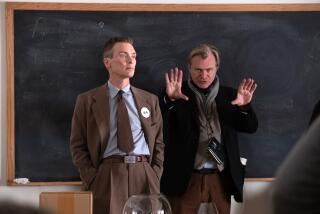‘Brexit’ vote sparks ‘grieving’ in Britain’s film and TV industries
Most fans of the horror series “Penny Dreadful” think of the Showtime drama as a British TV show. The story is set in turn-of-the-century London and many of the actors and writers are from the U.K. But “Penny Dreadful” has been a multinational show helped by the U.K.’s membership in the European Union -- a relationship the British people have just voted to sever.
“Our show was shot in Ireland; our first director, David Bayona, is a Spaniard; our actress, Eva Green, is French; the costume designer, Gabriella Pesucci, is Italian,” said London-based “Penny Dreadful” producer Pippa Harris. “It was a brilliant collaboration across all those European nationalities. It was the very best of working in the EU.”
Harris, like many Britain-based film and TV professionals, is now grappling with what Thursday’s historic “Brexit” vote means for her industry. Britain has had a bustling production scene for the last several years, the byproduct of a decade’s worth of government policy promoting the industry and a robust infrastructure that grew around the “Harry Potter” and “James Bond” series.
But independent British producers have largely relied on European partners to help finance their projects, and on an ability to collaborate across borders without tariffs or immigration barriers. As part of the EU, the U.K. benefited from film subsidies under the MEDIA/Creative Europe Programme, which provided funding for Oscar winners such as “The King’s Speech,” “Slumdog Millionaire” and “The Queen.”
Between 2007 and 2015, British filmmakers collected more than $145 million in financing from the program. That money, intended to encourage the spread of European film and other cultural industries, will no longer be available to them.
“I’m depressed, grieving,” said Jeremy Thomas, the British producer of European co-productions such as the 2013 Tilda Swinton film “Only Lovers Left Alive” and the 2011 Keira Knightley movie “A Dangerous Method.” “Freedom of trade and freedom of movement was very important to me and it worked very well. On a practical level, we now have to look at treaties, work permits, withholding taxes.”
Confused? We break down the ‘Brexit’ vote for you »
Representatives from the major U.S. studios declined to comment on how Brexit will impact their businesses, but the effect is likely to be mixed. In the short term, the studios may see some benefits from the referendum’s passage, as the pound falls relative to the U.S. dollar, making it cheaper to film movies and TV shows in the country.
In fact, some industry vendors are expecting an upswing in business.
Alex Hope, managing director of the London-based visual effects house Double Negative, which is currently at work on the visual effects for Paramount’s “Star Trek Beyond” and Warner Bros.’s “Justice League Part I,” told his employees in an email he thought his business would continue to thrive.
“Whilst I’m personally saddened and deeply frustrated by the result of the referendum… The value of [the British pound] means we are a very competitive place to bring U.S. film and TV productions for VFX work,” Hope said in the email sent to employees Friday morning.
The U.K.’s generous 25% tax incentive, which has been a lure for Hollywood production, will continue. But a weaker pound means studios will collect less revenue from the U.K. box office – at $1.9 billion, it was the the third-largest market in the world in 2015, according to the Motion Picture Assn. of America.
The MPAA indicated the American film industry is taking a wait-and-see approach to the issue.
“While it will take time to understand the full implications of the referendum result, we urge the UK government to prioritize a stable environment for the film and television sector to ensure it continues to be a driver for jobs and growth in the years to come,” an MPAA spokesman said in a statement.
Major U.S. media stocks were hit hard on a trading day that was bruising for global markets overall. Shares of 21st Century Fox, which has major British holdings, fell nearly 8% to $26.94 on Wall Street on Friday. Viacom Inc. declined 6%, while Lionsgate dropped 5%, and Time Warner Inc. and the Walt Disney Co. declined 3%.
“Uncertainty might be the greatest impact,” said Michael Ryan, the chairman of the Independent Film and Television Alliance, and a partner at GFM Films. “The U.K. employs a massive amount of people in this industry, and right now it’s a very confused place.”
One possible beneficiary of Britain’s referendum is its neighbor, Ireland, an English-speaking, EU member country with its own generous film tax incentive.
“Where else do you go? Germany? It might do the Irish a lot of good,” said Ryan, who is British but of Irish lineage. “I really am going to get myself an Irish passport because I’m so pissed off.”
HBO’s “Game of Thrones,” which films in Northern Ireland, which is part of the United Kingdom, won’t be affected by the referendum vote because it has not received European funding in recent seasons.
“We do not anticipate that the result of the EU referendum will have any material effect on HBO producing ‘Game of Thrones,’” said a spokesman for HBO.
ryan.faughnder@latimes.com
ALSO
‘Brexit’ means traveling to the U.K. will be much cheaper this summer
U.S. markets drop sharply after ‘Brexit’ vote increases global recession risk
Brexit live updates: What’s happening now that Britain voted to leave the EU
UPDATES:
3:54 p.m. : This article was updated with additional information. It was originally posted at 11:33 a.m.
More to Read
From the Oscars to the Emmys.
Get the Envelope newsletter for exclusive awards season coverage, behind-the-scenes stories from the Envelope podcast and columnist Glenn Whipp’s must-read analysis.
You may occasionally receive promotional content from the Los Angeles Times.








